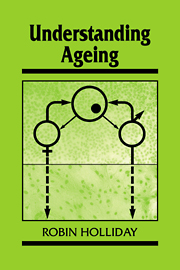Book contents
- Frontmatter
- Contents
- Preface
- Author's note
- Acknowledgements
- 1 Introduction
- 2 The evolved anatomical and physiological design of mammals
- 3 Maintenance of the adult organism
- 4 Theories of ageing
- 5 Cellular ageing
- 6 Genetic programmes for ageing
- 7 The evolution of longevity
- 8 Human disease and ageing
- 9 A better understanding of ageing
- Notes
- References
- Author index
- Subject index
5 - Cellular ageing
Published online by Cambridge University Press: 31 March 2010
- Frontmatter
- Contents
- Preface
- Author's note
- Acknowledgements
- 1 Introduction
- 2 The evolved anatomical and physiological design of mammals
- 3 Maintenance of the adult organism
- 4 Theories of ageing
- 5 Cellular ageing
- 6 Genetic programmes for ageing
- 7 The evolution of longevity
- 8 Human disease and ageing
- 9 A better understanding of ageing
- Notes
- References
- Author index
- Subject index
Summary
The finite lifespan of the soma also means that somatic cells cannot survive indefinitely. It is nevertheless possible that the death of somatic cells is not due to intrinsic cellular events, but rather to extrinsic ones. Their eventual death could be due to the failure of one or more of the interactions that are necessary for the normal functions of the organism. Such interactions can occur at a distance mediated, for example, by growth factors or hormones, or at the level of cell–cell contacts, within or between tissues. Although a break-down of interactions between cells and tissues may well be an important component of ageing, there is much evidence that cells are subject to intrinsic changes that lead to their senescence and death. A very good example of the dramatic changes that can occur in cells as a result of normal ageing is shown in Figure 5.1a, b. The lens from an infant and an 80-year-old individual were obtained post-mortem, and the epithelial cells were then grown in primary culture under the same conditions. There is much experimental evidence that dividing cells undergo ageing both in vitro and in vivo. In the former situation, cells are studied in culture under well-defined conditions. In the latter, their fate is followed by transplantation from animal to animal.
THE FINITE LIFESPAN OF CELLS IN CULTURE
When Weismann realised that there is a crucial distinction between germ line and somatic cells, he also made the remarkable prediction that all somatic cells should also have finite lifespan (Kirkwood & Cremer 1982).
- Type
- Chapter
- Information
- Understanding Ageing , pp. 67 - 86Publisher: Cambridge University PressPrint publication year: 1995

